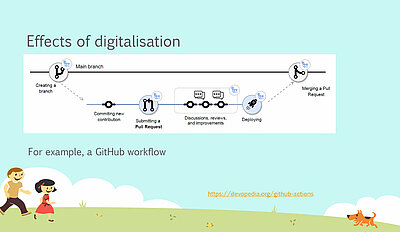
What are the new ways of working for technical communicators?
A summary of the IUNTC Talk on Mai, 23, 2023, by Monika Vortisch
Kai Weber led the most recent meeting of the International University Network in Technical Communication (IUNTC) on March 23, 2023. He asked about new ways of working for technical writers, as technical communication is undergoing fundamental changes due to automation, digitalization, and globalization. What are the effects of digitalization: How does it change the way we work?
Kai Weber is a lead technical writer for financial and banking software, SimCorp GmbH. He is a long-standing member of tekom and a regular conference speaker.
Read full article
The group discussed what kind of changes technical writers have to deal with nowadays. The participants agreed that the working practices of technical writers have shifted considerably: communication, collaboration and shared learning are highly relevant today.
Communicating in agile teams, applying more frequent, less formal feedback and working in shorter increments of time for rapid or continuous delivery is gaining more and more importance. You must deliver something every day; testing is much shorter and more interactive.
These developments imply that technical writers need to acquire more and different competencies than before. “I was just surprised I had to develop skills I hadn’t before,” said one of the participants.
For technical editors, who used to belong to a separate department, this means a serious change. The backing of the doc team is missing; editors have to work independently and make decisions on their own. As this way of working requires a high level of personal responsibility, it means a big change for employees who are used to hierarchical structures.
The big advantage of agile teams: daily communication in the meetings gives all team members insight into each other's work. Technical writers often get direct feedback on their documentation and can then adjust it to improve the user experience.
Video conferencing or web meetings are extremely important for editors, as they usually have no access to the development environment and must rely on being part of the information flow.
In the context of agile development, only a few specifications are still available to editors as a source of information. Therefore, a good document management system helps to manage documents. Most technical writers see this as an advantage: products and their documentation are tested in a timely manner so that errors are discovered more quickly, and the editors' work can be assessed.
When working according to the waterfall principle, developers often have no way of recording their meetings with editors in terms of time. In Scrum mode, the creation of individual texts is a backlog item, which also strengthens the position of the editor in the team. A key takeaway from the meeting was that technical writers must have an open ear; their documentation might otherwise fall out of step.
IUNTC participants thanked Kai for his interesting and insightful presentation.
